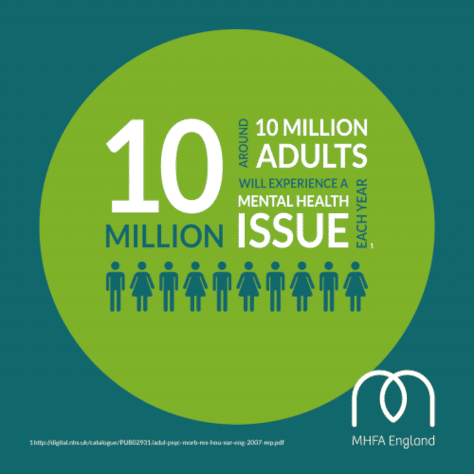

What is a Mental Health First Aider, and Why are they Important?
Overview of MHFA
Mental Health First Aid goes way beyond providing support in a crisis. And in this article, we are going to look at the many benefits of having a mental health first aider.
Compulsory mental health first aid in every workplace is now a step closer to becoming a legal requirement as Dean Russell MP and Where’s Your Head At? Ambassador introduced his Parliamentary Bill in March 2021 which had no objections, going straight through to second reading.
But what actually is mental health first aid? Like physical first aid, the aims are similar in that it is designed to
Preserve life
Provide comfort
Promote recovery
In addition to this, MHFAs are trained to spot the early warning signs of emerging mental ill-health; develop confidence to have a supportive and proactive conversation; and be confident in guiding someone to the appropriate professional help.
Their role is to listen rather than advise. They do not diagnose. It is about being there in the moment for that person. And it can be really rewarding for the individuals who train in this role and are able to use their skills to support others.
The benefits are wide and varied and encompass a number of the 5 ways to wellbeing (5 things which are proven to improve your wellbeing.) Supporting others links with ‘giving’; it provides a great ‘learning’ opportunity; and very much helps those ‘connections’ and positive relationships within the workplace.
As this starts to drive a supportive culture of openness it starts to encourage more discussion between people and makes them more mindful of checking in on others too. Leading to a happier, and healthier workforce who feel able to open up and ask for help when they need it.
On their training journey they will develop skills such as non-judgemental listening and how to show empathy. These skills can be transferred to many other aspects of work and life too.
The reality is that many people experience mental ill health but simply do not know where to turn for help. They may struggle to open up and ask for that help. Mental health first aiders are another step an organisation can take in moving forward to a culture that is open and supportive of their people and demonstrates that work is a safe place to open up, as well as having a level of support available.
They are an initial point of contact, someone who is trained to listen, but we make the boundaries very clear in our training that they are not a counsellor or therapist. They are there to guide and signpost those people who don’t know where to go for help.

Where it fits- strategy and culture, HSE, and Duty of Care
Mental health first aiders therefore not only are trained in terms of dealing with a crisis, but they are also trained to understand what promotes good wellbeing in an individual and ways of being proactive around this. Having this education makes them perfect fit to support in the delivery of an organisation’s wellbeing strategy. They can lead wellbeing initiatives; open up communication channels and keep those positive messages consistent. As well as educating others around the importance of self-care too.
Signposting is a key part of the role of an MHFA, and this is both internal and external signposting. Internally this could be about the organisation’s Employee Assistance Programme. EAPs are so often under-utilised but they promote great education for employee wellness, as well as support in a crisis. There is usually a very proactive element of an EAP which is often missed in an organisation’s communication to their team. They are a great resource which should be shouted about, yet in reality there tends to be very few employees who really understand what their EAP can provide. Mental health first aiders can therefore promote better the internal support system available. They can be the enabler. Leading to a happier, more well and more productive workforce.
The Heath and Safety Executive highlight that employers have a duty of care to their employees not just in terms of their physical safety, but also their psychological safety.
An employer may also have legal obligations in relation to the Equality Act 2010 in terms of making reasonable adjustments with regards a staff members mental health. Having a good understanding of how different mental health conditions could affect someone day to day can really help make this process much easier and more effective for the team member.

Further benefits
Being trained in mental health first aid can really assist in the return to work process for someone who has been off with mental ill health. Yarker et al in 2020 identified the following as key drivers which determined how likely an employee was to thrive in the workplace following mental ill health absence leave:
That the person receives non-judgemental support
They have access to health and advice outside of work
They are able to contact specific charities
Given MHFA training encompasses all of the above, it can be an extremely beneficial course for both line managers and HR managers as well as those keen to volunteer (it is important to have a diverse team of MHFAs as this makes them more accessible for others within the organisation.)

Other considerations
When implementing mental health first aiders within an organisation it is important to view them as part of the overarching wellbeing strategy. (We can help with this if it isn’t something you already have in place)
Providing clarity on the boundaries of the role helps the psychological safety of the MHFA as well as manage the expectations of the person needing support.
Consider what support is in place for your mental health first aiders. How often do you check in with them? How do you facilitate the profiling of the role? What other proactive work can they do to support your wellbeing strategy?
What other employee benefits do you offer? It is a great opportunity to review your EAP for example and ensure people do utilise the benefits available to them. For instance, counselling sessions can be available immediately to the employee rather than waiting potentially months through the NHS. This is worth its weight in gold when looking at employee wellness.
Do existing policies and procedures need updating? A great place to start is to review both the employee lifecycle and ‘a day in the life’ of an employee. Taking a look at each stage from recruitment, through to onboarding and beyond highlights many opportunities to shout about the support available. It can aid in attracting the right people to the organisation and can support retention too- all adding to that bottom line.

What does it involve?
The MHFA England mental health first aid course can be run either online (across 4 x 2.5 hour interactive sessions with e-learning) or face to face in 2 days.
To find more about more about mental health first aid or if you have any questions you can contact Jennifer at jennifer.rawlinson@flourishinmind.co.uk or visit the Flourish In Mind website.



